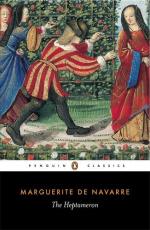And thus we can pretty well decide what is the most interesting and important part of the whole subject. The question, What is the special virtue of the Heptameron? I have myself little hesitation in answering. There is no book, in prose and of so early a date, which shows to me the characteristic of the time as it influenced the two great literary nations of Europe so distinctly as this book of Margaret of Angouleme. Take it as a book of Court gossip, and it is rather less interesting than most books of Court gossip, which is saying much. Take it as the performance of a single person, and you are confronted with the difficulty that it is quite unlike that other person’s more certain works, and that it is in all probability a joint affair. Take its separate stories, and, with rare exceptions, they are not of the first order of interest, or even of the second. But separate the individual purport of these stories from the general colour or tone of them; take this general colour or tone in connection with the tenor of the intermediate conversations, which form so striking a characteristic of the book, and something quite different appears. It is that same peculiarity which appears in places and persons and things so different as Spenser, as the poetry of the Pleiade, as Montaigne, as Raleigh, as Donne, as the group of singers known as the Caroline poets. It is a peculiarity which has shown itself in different forms at different times, but never in such vigour and precision as at this time. It combines a profound and certainly sincere—almost severe—religiosity with a very vigorous practice of some things which the religion it professes does not at all countenance. It has an almost morbidly pronounced simultaneous sense of the joys and the sorrows of human life, the enjoyment of the joys being perfectly frank, and the feeling of the sorrows not in the least sentimental. It unites a great general refinement of thought, manners, opinion, with an almost astonishing occasional coarseness of opinion, manners, thought. The prevailing note in it is a profound melancholy mixed with flashes and intervals of a no less profound delight. There is in it the sense of death, to a strange and, at first sight, almost unintelligible extent. Only when one remembers the long night of the religious wars which was just about to fall on France, just as after Spenser, Puritan as he was, after Carew and Herrick still more, a night of a similar character




